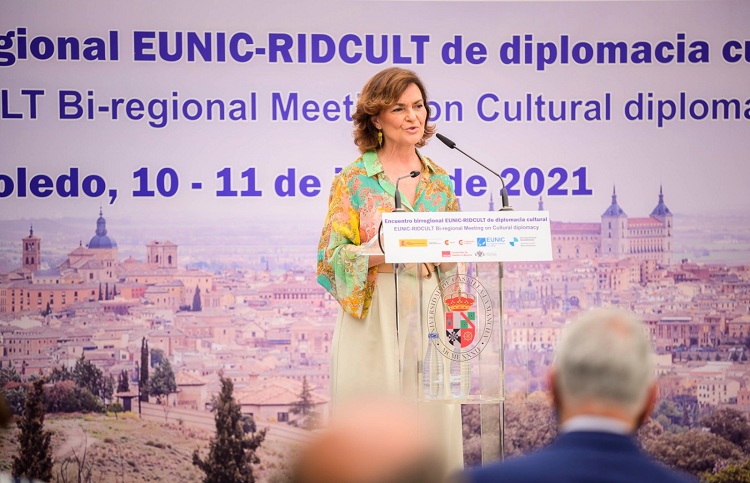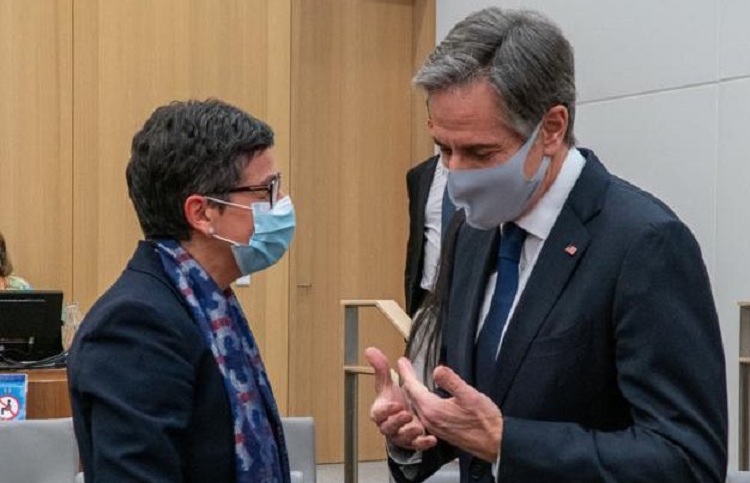The Diplomat
Spain has assumed the presidency of the European Network of National Institutes for Culture (EUNIC) with the aim of “incorporating the Ibero-American dimension into the European perspective and strengthening cultural diplomacy as an engine for social transformation and development”.
The change in the presidency took place during the meeting between the European Network of National Institutes for Culture (EUNIC) and the Ibero-American Network of Cultural Diplomacy (RIDCULT), which began last Thursday and was closed yesterday in Toledo with the presence of more than a hundred authorities and European and Ibero-American delegations.
During these days, held at the headquarters of the University of Castilla-La Mancha, Spain has assumed the presidency of EUNIC for one year, through the Directorate of Cultural and Scientific Relations of the Spanish Agency for International Development Cooperation (AECID). The new president of EUNIC, Guzmán Palacios, has highlighted the opportunity of “an occasion like this to promote cultural cooperation actions”. Spain’s priorities during EUNIC’s annual mandate, according to the Ministry of Foreign Affairs, will be “to incorporate the Ibero-American dimension into the European perspective and to strengthen cultural diplomacy as an engine for social transformation and development”.
Last Thursday, the delegations of both cultural networks held their general assemblies in parallel, and yesterday, Friday, the bi-regional meeting took place, which for the first time allowed for joint interaction between representatives of the 35 EUNIC cultural institutions from the 27 member states of the European Union, including the AECID and the Cervantes Institute, and the 22 Ibero-American counterparts of RIDCULT.
At the end of the meeting, two important declarations were adopted: a commitment between EUNIC and RIDCULT on Culture and Development and the declaration between EUNIC and the EEAS to promote European cultural diplomacy in the international arena, which will include the celebration in 2022 of the Euro-American Cultural Week simultaneously in 125 cities in 95 countries.
At the opening of yesterday’s session, the Secretary of State for International Cooperation, Ángeles Moreno Bau, affirmed that “without culture there is no sustainable development” and underscored its transformative potential in “the fight against poverty and exclusion”. In addition to the members of EUNIC and RIDCULT, the meeting was attended by the First Vice-President of the Government, Carmen Calvo; the President of Castilla-La Mancha, Emiliano García-Page; the Secretary General of the European External Action Service (EEAS), Stefano Sannino; the Ibero-American Secretary General, Rebeca Grynspan; and the Deputy Director General for Culture of UNESCO, Ernesto Ottone, as well as more than forty European and Ibero-American ambassadors accredited in Madrid.
At the closing ceremony, the mayoress of Toledo, Milagros Tolón, declared that Toledo was “the best possible setting” for its “historical example of intercultural coexistence, harmony and as the City of Three Cultures”. For his part, Stefano Sannino recalled that “Europeans and Latin Americans are, in many respects, the most similar cultures in the world” because “we share history, languages and common values”, and Rebeca Grynspan said that “Ibero-America is a cultural powerhouse of diversity and excellence, not only in our artistic creation but also in the vision of culture as the essence of freedom, a passport to the world and a driving force for development”.
Likewise, Carmen Calvo -who was Minister of Culture between 2004 and 2007- defined culture as “the instrument of peace, the bridge of coexistence”, because “it allows us to understand the context of the other, to bring worlds closer together”, which is why “cultural diplomacy is so important and valuable”. Finally, Emiliano García-Page stressed the importance of “a cultural legacy that we must see as an end and as a means, as a bridge between Europe and Latin America”.







